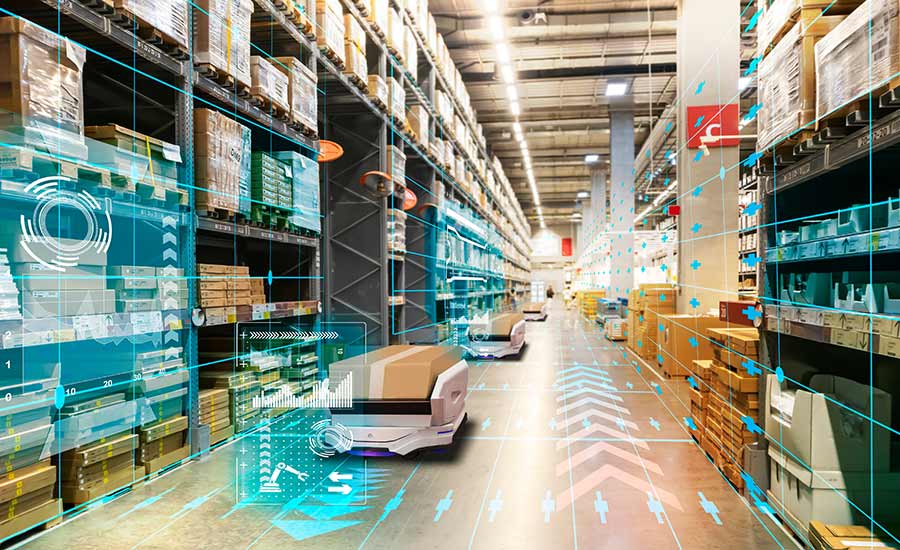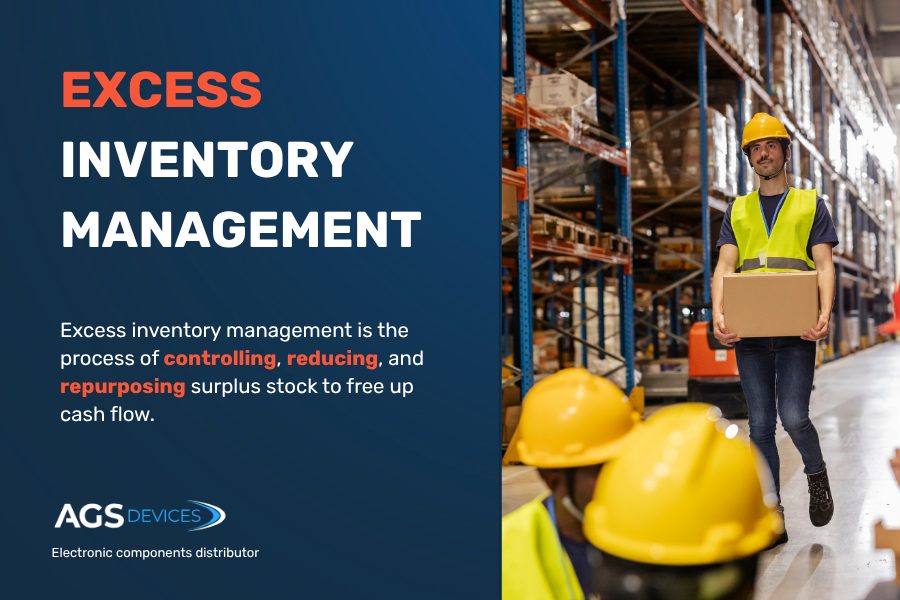
Recent advancements in AI have the potential to generate $1.3 trillion to $2 trillion in annual value for supply chain and manufacturing.
With the help of AI, some supply chain and manufacturing companies could reduce costs by 15% or cut forecasting errors by up to 50%.
What’s more, with advancements like Nvidia’s powerful GPUs, AI technologies are overcoming traditional challenges and setting new standards for performance and resilience in the supply chain.
We’ll explore how AI is enhancing operational efficiency and creating a smarter, more adaptable supply chain to meet the demands of today’s dynamic market.
Understanding AI in Supply Chain Management
The integration of AI in supply chain management is leading to improved efficiency, accuracy, and smarter decision-making.
Here’s what how AI works in supply chain management:
The Role of AI in Supply Chains
AI integrates advanced algorithms, machine learning, and data analytics to process vast amounts of data quickly and accurately. In supply chain management, AI can predict demand patterns, identify inefficiencies, and automate routine tasks, allowing human workers to focus on more strategic activities.
For instance, AI-driven predictive analytics can forecast future demand based on historical data, current market trends, and external factors, enabling companies to plan more effectively.
Key AI Technologies in Use
Several key AI technologies are transforming supply chains such as:
- Machine learning (ML): ML algorithms learn from historical data to improve accuracy in demand forecasting and risk management.
- Natural language processing (NLP): NLP enables better communication and data processing by understanding and responding to human language, improving interactions with suppliers and customers.
- Robotics and automation: AI-powered robots enhance warehouse operations by automating picking, packing, and sorting tasks, reducing errors and speeding up processes.
- Computer vision: This technology is used for quality control and inventory management, ensuring that products meet standards and stock levels are accurately tracked.
Benefits of AI in Supply Chain Management
Integrating AI in supply chain management offers numerous benefits such as:
- Enhanced efficiency: AI streamlines operations by automating repetitive tasks and optimizing processes, leading to faster turnaround times and reduced operational costs.
- Improved accuracy: With AI, businesses can achieve higher accuracy in demand forecasting, inventory management, and order fulfillment, reducing the likelihood of stockouts or overstock situations.
- Real-time visibility: AI provides real-time insights into the supply chain, allowing for proactive decision-making and quicker responses to disruptions.
- Scalability: AI systems can scale operations smoothly, handling larger volumes of data and complexity as the business grows.
Challenges and Considerations
Despite its benefits, implementing AI in supply chain management also presents challenge such as:
- Data quality and integration: Ensuring high-quality data and integrating it from various sources is crucial for AI to function effectively.
- Cost and complexity: The initial investment in AI technology can be significant, and the complexity of implementation requires careful planning and expertise.
- Change management: Transitioning to AI-driven processes requires a cultural shift within the organization, with employees needing to adapt to new technologies and workflows.
AI-Driven Innovations in Logistics and Transportation
Artificial Intelligence (AI) is revolutionizing logistics and transportation, offering various capabilities to streamline operations and enhance efficiency.
Route Optimization
AI-driven route optimization uses advanced algorithms to determine the most efficient paths for delivery vehicles.
This technology considers various factors, such as traffic patterns, weather conditions, and delivery time windows, to calculate the best routes. By continuously analyzing data, AI can adjust routes in real-time to avoid delays and minimize fuel consumption.
- Dynamic routing: AI can dynamically reroute vehicles to avoid traffic congestion or road closures, ensuring timely deliveries.
- Cost savings: Optimizing routes reduces fuel usage and vehicle wear and tear, leading to significant cost savings for logistics companies.
- Environmental impact: Efficient routing helps lower carbon emissions, contributing to a greener supply chain.
Real-Time Tracking and Monitoring
Real-time tracking and monitoring of shipments are crucial for maintaining supply chain visibility and ensuring timely deliveries. AI enhances these capabilities by integrating IoT devices, sensors, and advanced analytics.
- Enhanced visibility: AI provides real-time updates on the location and status of shipments, allowing companies to track their goods throughout the entire supply chain.
- Predictive analytics: By analyzing historical data and current conditions, AI can predict potential delays and disruptions, enabling proactive measures to mitigate risks.
- Customer satisfaction: Real-time tracking improves transparency and communication with customers, providing accurate delivery estimates and status updates.
Warehouse Automation
AI-powered warehouse automation involves using robotics, machine learning, and computer vision to streamline warehouse operations. This technology improves efficiency, reduces errors, and enhances inventory management.
It also offers advancements in:
- Automated picking and packing: AI-driven robots can handle picking and packing tasks with high accuracy and speed, reducing labor costs and minimizing errors.
- Inventory management: AI systems continuously monitor inventory levels, predicting stock needs and automating restocking processes to avoid stockouts or overstock situations.
- Quality control: Computer vision technology inspects products for defects, ensuring that only high-quality items are shipped to customers.

Overcoming Challenges in AI Integration
Successfully overcoming challenges in supply chain is essential to fully leverage the potential of AI.
Here’s how companies are overcoming challenges in AI integration:
Data Quality and Management
High-quality data is the backbone of effective AI systems. Ensuring that the data used for AI applications is accurate, complete, and relevant is essential for reliable outcomes.
Inaccurate or outdated data can lead to flawed AI predictions and decisions. Implementing robust data validation and cleansing processes helps maintain data integrity.
Also, AI systems often require data from various sources, such as sensors, ERP systems, and customer databases. Effective integration of these disparate data sets is necessary to provide a comprehensive view of the supply chain.
It’s important to establish clear data governance policies to ensure data is handled consistently and securely across the organization. This includes defining data ownership, access controls, and compliance with regulatory standards.
Talent and Expertise
The successful implementation of AI in supply chain management requires specialized skills and knowledge. Building a team with the right expertise is a significant challenge for many organizations.
AI projects need data scientists, machine learning engineers, and domain experts who understand both the technology and the intricacies of supply chain operations. Investing in recruitment and training is essential to build a capable team.
The field of AI is rapidly evolving. Providing ongoing education and upskilling opportunities for employees ensures that they stay updated with the latest developments and best practices.
AI integration requires collaboration across different departments, including IT, logistics, and operations. Encouraging cross-functional teamwork helps in aligning AI initiatives with business objectives and operational realities.
Technical Infrastructure
A robust technical infrastructure is critical to support AI applications in supply chain management. This includes the necessary hardware, software, and network capabilities.
- Scalable IT infrastructure: AI systems often require substantial computational power and storage. Investing in scalable infrastructure, such as cloud computing and high-performance servers, ensures that the system can handle large data volumes and complex algorithms.
- Integration with legacy systems: Many organizations have existing legacy systems that are not designed to work with modern AI technologies. Ensuring seamless integration between AI solutions and these legacy systems can be challenging but is essential for leveraging existing investments.
- Cybersecurity: AI systems can introduce new security vulnerabilities. Implementing robust cybersecurity measures protects sensitive data and ensures the integrity of AI operations.
Dependency on Nvidia Technology
Nvidia has become a cornerstone in the development and deployment of artificial intelligence (AI) technologies, particularly within supply chain management.
The company’s advanced graphics processing units (GPUs) and comprehensive AI software ecosystem are critical components that drive innovation and efficiency in various applications.
The Role of Nvidia GPUs in AI
Nvidia GPUs are renowned for their superior processing power, which is essential for handling the complex computations required in AI applications.
- Superior processing power: Nvidia GPUs excel at parallel processing, making them ideal for the intensive tasks involved in machine learning and deep learning algorithms. This capability allows for faster training of AI models and real-time data analysis.
- Energy efficiency: Despite their high performance, Nvidia GPUs are designed to be energy-efficient, reducing the overall operational costs associated with running AI systems.
- Scalability: Nvidia’s GPUs can be scaled to meet the demands of large AI projects, enabling organizations to expand their AI capabilities as needed without significant hardware changes.

Nvidia’s AI Software Ecosystem
Beyond hardware, Nvidia provides a robust AI software ecosystem that supports the development and deployment of AI applications.
- CUDA and Deep Learning Frameworks: Nvidia’s CUDA platform allows developers to leverage the power of GPUs for general computing tasks. Additionally, deep learning frameworks like TensorFlow and PyTorch are optimized for Nvidia GPUs, streamlining the development process.
- Nvidia TensorRT and Triton: TensorRT is a high-performance deep learning inference library that optimizes AI models for production environments. Nvidia Triton Inference Server facilitates scalable and efficient deployment of AI models, ensuring that they perform optimally in real-world scenarios.
- Development tools: Nvidia provides a suite of tools such as Nsight and JetPack that assist developers in debugging, optimizing, and deploying AI applications efficiently.
Industry Applications of Nvidia Technology
Nvidia technology is used in many industries, showing its versatility and impact.
- Supply chain and logistics: In supply chain management, Nvidia GPUs power predictive analytics, real-time tracking, and autonomous vehicles, enhancing efficiency and reducing operational costs.
- Healthcare: Nvidia GPUs enable advanced diagnostics and personalized medicine by accelerating the processing of medical images and genomic data.
- Automotive: Nvidia’s AI technology supports autonomous driving systems, improving safety and performance in the automotive industry.
- Finance: Financial institutions use Nvidia GPUs for risk management, fraud detection, and algorithmic trading, leveraging their speed and precision.
Future Developments and Nvidia’s Roadmap
Nvidia continues to innovate, with several developments on the horizon that promise to further enhance AI capabilities.
- Next-Generation GPUs: Nvidia is continually advancing its GPU technology, with new models offering even greater performance and efficiency. These advancements will further reduce the time required to train AI models and improve inference speeds.
- AI platforms and partnerships: Nvidia is expanding its AI platforms and forming strategic partnerships with leading tech companies and research institutions. These collaborations aim to push the boundaries of what AI can achieve.
- Edge computing: Nvidia is focusing on edge computing solutions, which bring AI capabilities closer to the data source. This approach reduces latency and bandwidth usage, making AI applications more responsive and efficient.
Sustainability initiatives: Nvidia is committed to reducing the environmental impact of its technology, focusing on energy-efficient designs and sustainable manufacturing practices.
Nvidia’s technology is integral to the development and deployment of AI in supply chain management and beyond. Its powerful GPUs, comprehensive software ecosystem, and ongoing innovations ensure that Nvidia remains at the forefront of AI advancements, driving efficiency, accuracy, and scalability across industries.
The Role of AGS Devices in AI-Driven Supply Chains
At AGS Devices, we bring nearly two decades of expertise in the electronics sector, including the cutting-edge field of Artificial Intelligence (AI) electronic components.
Our mission is to supply and distribute top-quality integrated circuits, resistors, capacitors, transistors, and diodes—key components that power and advance AI technologies.
As a leading distributor of AI electronic components, we strive to enhance the efficiency and reliability of your supply chain in this rapidly evolving field. Our experienced team utilizes the latest technology and insights to deliver high-quality components at competitive prices.
We also distribute electronic components such as:
- Power Supply Distributors
- Optoelectronics
- Circuit Protection
- Interconnects
- Passive Components Electronics
- Electronic Testing Equipment
- Electromechanical Devices
Partnering with AGS Devices means collaborating with a team dedicated to optimizing and streamlining your AI-based manufacturing and development processes from start to finish.
